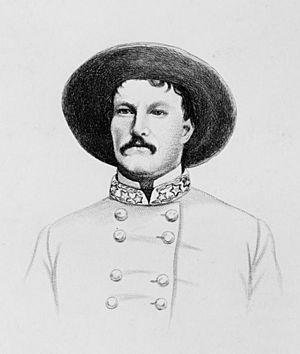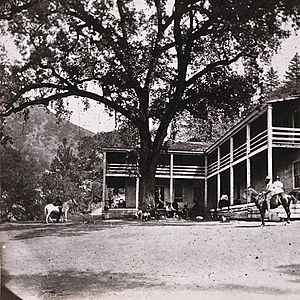Archibald C. Godwin facts for kids
Quick facts for kids
Archibald C. Godwin
|
|
|---|---|
 |
|
| Born | 1831 Nansemond County, Virginia |
| Died | September 19, 1864 (aged 32–33) Winchester, Virginia |
| Place of burial |
Stonewall Cemetery in Winchester, Virginia
|
| Allegiance | |
| Service/ |
|
| Years of service | 1861-1864 |
| Rank | Colonel Brigadier General (unconfirmed) |
| Battles/wars | American Civil War |
Archibald Campbell Godwin (born 1831 – died September 19, 1864) was a military leader during the American Civil War. He served as a brigadier general in the Confederate States Army. Sadly, he was killed in action at the Battle of Opequon. Because he died soon after being promoted, his new rank was never officially confirmed by the Confederate government.
Contents
Early Life and Adventures
Archibald C. Godwin was born in Nansemond County, Virginia, in 1831. When he was very young, he moved to Portsmouth, Virginia, where he grew up and went to school.
Around the age of 19, Archibald decided to seek his fortune in California. This was during the exciting time of the California Gold Rush, when many people hoped to find gold and get rich.
Life in California
In California, Archibald Godwin became very successful. He made money from cattle, timber, land, and mining. By 1854, he lived in an area that is now called Geyserville, California. He owned a large amount of land and ran businesses selling goods and raising livestock.
Because many Native Americans lived near the Russian River, the government asked Godwin to be an "Indian agent." This meant he helped manage relations between the government and the Native American communities. People noted that he had a lot of influence with them.
Godwin also found hot springs on his land, which later became known as The Geysers. He built The Geysers Resort Hotel to attract visitors to these natural hot springs. He also discovered valuable cinnabar ore, which is used to get mercury (also called quicksilver). He had to go to court to protect his mining rights, but he successfully represented himself.
Archibald Godwin also got involved in local government. In 1855, he was elected as a Justice of the Peace, which is like a local judge. He also helped with road committees. When his home state of Virginia left the United States, Godwin decided to return home. He rented out his businesses and left his other properties with friends.
Serving in the Civil War
When the American Civil War began in 1861, Godwin went back to Virginia to join the Confederate Army.
Early Duties
At first, Godwin worked in the provost's department. This department was in charge of military police duties and managing prisoners. He served as a captain and then a major. He was also in charge of Libby Prison for a time. Later, Jefferson Davis, the President of the Confederacy, asked him to run a prison camp in Salisbury, North Carolina. This camp was built for Union soldiers captured during the war.
Fighting on the Front Lines
In July 1862, Godwin was moved to the front lines of the war. He became a colonel and led the 57th North Carolina Infantry regiment.
His first major battle was the Battle of Fredericksburg in December 1862. He also fought in the Battle of Chancellorsville. In the summer of 1863, he marched with his troops to Gettysburg, Pennsylvania. He took part in the attack on Cemetery Hill during the Battle of Gettysburg.
During the Battle of Gettysburg, his commander was badly wounded. Colonel Godwin then took temporary command of the brigade. He led them back to Virginia. In August 1864, he was promoted to brigadier general. He commanded what was known as Hoke's Brigade. However, because he died soon after, his promotion was never officially confirmed by the Confederate government.
Death in Battle
On September 19, 1864, Archibald C. Godwin was killed during the Third Battle of Winchester. He is buried at Stonewall Cemetery in Winchester, Virginia. There is also a monument in his honor at Cedar Grove Cemetery in Portsmouth, Virginia.
 | Precious Adams |
 | Lauren Anderson |
 | Janet Collins |


